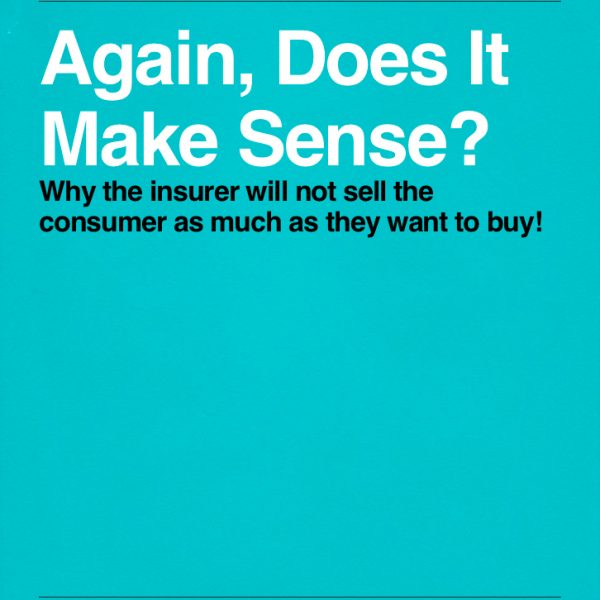Underwriters as a profession were under fire as they became more and more in the forefront of broker complaints. Brokers were everywhere and their demands were seen as reasonable by marketing types and unreasonable by underwriters and their leaders. I got into a bit of a controversy (not my first time) by suggesting that education and medical knowledge did not represent 100% of what constitutes a great underwriter. Delivering a message and being flexible were attributes most needed to the medically competent. Underwriting has never been an exact science and with pricing becoming less of an exact science (preferred and the guesses surrounding what price for what preferred criteria were growing) as well as the need to comprehend the complete proposed insured and sell a decision was foremost in skill set demands.
Steve the editor of MO said put it in writing thee thought s of yours and he would see to it that someone would read it. Response was mixed. The academic underwriter said medical knowledge was still the be all and end all with communication skill an unnecessary asset. The practical well respected guru of risk selection said I was right on and asked if I had a test to determine which underwriter had the moxie to make it to great.
Ross A. Morton
2004-05-10
Marketing Options
May 1993
Isn’t it strange that now that higher employment in the life insurance business is escaping the stranglehold of actuaries, the banks are hiring big company actuaries to start their life operations? Just as perplexing is the new trend to hire those endowed with banking experience to run life companies. But I will not critically analyze more informed decisions than mine; rather let’s look at hiring the senior home office underwriter – a subject upon which I can speak with more authority.
Hiring a home office underwriter may first appear to be a tough task. In my business (no, not the banking business), the delicate egos in the field must be catered to by meek minions in head office. Thus, the astute discharge of the demanding task of hiring a home office underwriter suggests that need for Solomonic Skills.
Ask a life broker who to hire and he responds, “The most liberal, of course”. By definition, this is the underwriter who has a strong bias to the word “yes” and needs trifocals. Ask the same questions to the pricing actuary who sets those ungodly low prices for the product and this chameleon of the numbers world screams for the most conservative and restrained of persons.
As a means of placating their desire to be part of the recruiting process, I once asked some field types to suggest what they deemed the most cherished qualities of a senior underwriter. This was not an act of condescending chicanery, but rather a sincere attempt to let those who depend on good underwriters have concrete input. They told me.
After I overcame the palpitations and nausea, I asked for a list of candidates, this time ones that they had actually encountered over the years that would make solid contributions to building teamwork between field and home office. Their responses didn’t have me exactly bouncing in bliss, but at least the nausea stopped. Unfortunately, it turned out that those on this list shared a universal willingness to deal and they all had demeanors who knew how to treat a god – sorry, I mean a broker.
From my own point of view, the two qualities that I would look for in selecting a senior underwriter are expertise in risk evaluation and communication skills.
My critics may well challenge me on the first. With the growing use of computers in the underwriting process, why is expertise in risk evaluation still so important? It’s true that the new expert systems now being offered have superb capabilities to transfer data and eliminate the underwriting drudgery of running your finder down a check list. Indeed, jet issue has become computer issue.
Underwriting logic is now being transferred to computers so a broker in the field can follow the underwriting instructions on the screen and key in the underwriting information. If the client indicates that he is diabetic, the computer program can adapt to this information and pop up additional questions on the screen for the broker to ask. All the broker has to do now is return to the office with his electronic application on disk where it can be loaded into the mainframe for evaluation. (Note: Here we are in 2004 and all that software that contains the rules of the best and most accommodating underwriters still sits idly by. I grossly underestimated the tardiness with which insurers would embrace technology in underwriting and how insurance leadership would continue the drudgery of simple case underwriting. No wonder underwriters are lulled into a trance and then make mistakes on the case that really did need their attention.)
But, and it’s a big but, here’s where the problems begin for the foreseeable future. Unfortunately, the penmanship of most doctors is o bad that no computer scans can hope to load information directly from an Attending Physician’s Statement. Therefore, a senior underwriter or a medical doctor is required to key in the results of an APS into the computer. At this time, it’s faster for a good senior underwriter to make the decisions than it is to key the information and wait for the computer to provide the answers.
So much for competence in risk evaluation. As for communication skills, the reader must surely concede that there are times a question must be asked or a “no” delivered. There actually are recorded cases where the broker impeded and confused the underwriter. I recall a true situation that happened just west of Regina. An application arrived unannounced one day to the desk of an underwriter who had a reputation of being as brazen as any broker. The case was large. The financial history was non-existent.
The underwriter asked in a routine fashion for more detail. The broker being well-trained and versed in the art of diplomacy and tact said to the underwriter, “Cjwhdg lkjkd kd lkjfldk dswq,” or in English, “You’re stupid – there’s a very valid reason for insurance.”
It is best now that I move this story past a few choice pieces of dramatic prose and conclude with the broker’s enlightening statement, “Don’t you know who the applicant is and where the money is coming from?” Not to be outdone by the broker, the underwriter used her barroom verbiage to state, “KlKll ioe iopp laes iitmvc,” or in polite broker English, “I have no idea and would cherish the moment you told me.”
After senior representatives from both camps endangered there well-being by interceding the case reached conclusion. A happy conclusion in fact arrived three months later when the broker educated the underwriter with the tidbit that the applicant was the son of one of the wealthiest men in Alberta and the sole heir to all the money. The broker’s argument was that the underwriter should know all the rich people in Canada (and their heirs) by name.
With the demise of some life insurance providers as predicted by the life industry (always first with the news), there should be more than sufficient talent around in the next few years to fill all remaining senior underwriting positions. With further computer automation of the risk selection process, only the exceptional skilled and verbally competent senior underwriter will survive. Hiring a good one will be easy; they’ll be the only kind left.

